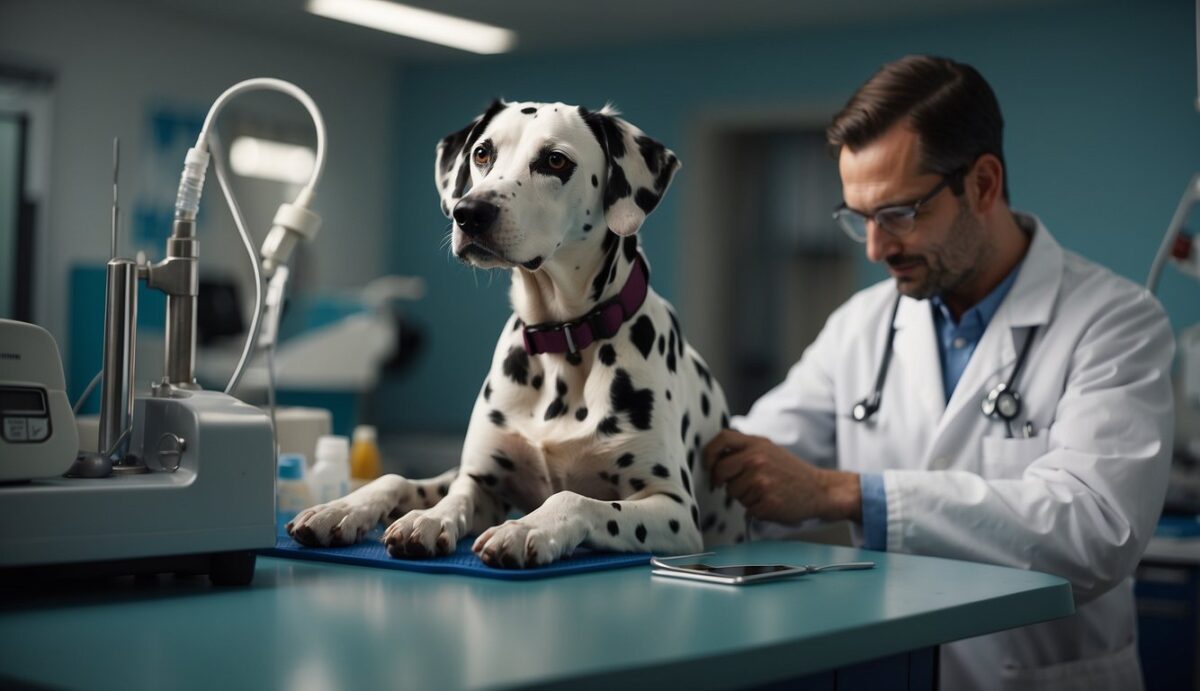Liver health is crucial for the wellbeing of Dalmatians, just as it is for all breeds of dogs.
Given the multifunctional nature of the liver, health issues affecting it can have widespread repercussions on your Dalmatian’s overall health.
It’s important to be aware that symptoms of liver disease might not be unique to this condition alone, as they can resemble signs of other illnesses.
Early detection and management are key in preventing more serious complications.
To maintain the liver health of your Dalmatian, implementing preventive strategies is paramount.
This includes a balanced diet, regular exercise, and routine veterinary screenings.
If liver disease is suspected, prompt diagnostic procedures such as blood tests and imaging can lead to early management, improving the outcome for your pet.
Treatment varies according to the specific liver condition diagnosed, but often involves dietary changes, medications, and in some cases, surgery.
Key Takeaways
- Recognition of liver disease symptoms and early intervention are essential.
- Preventive care for liver health includes diet, exercise, and regular vet visits.
- Treatment plans for liver issues are tailored to your Dalmatian’s specific needs.
Understanding Liver Health in Dalmatians

Your Dalmatian’s liver is a vital organ performing multiple functions critical to their health.
It’s important to understand how it works, recognize the signs when things aren’t right, and be aware of the conditions that can affect your dog’s liver.
Functions of the Liver
The liver is your Dalmatian’s internal chemical processing plant. It has a significant role in:
- Detoxification: Removing toxins from the blood.
- Metabolism: Aiding in the digestion and conversion of nutrients.
- Storage: Keeping vitamins and minerals until needed.
- Production: Creating bile to help digest fats and blood-clotting proteins.
Understanding these functions helps in recognizing when the organ may not be performing optimally.
Signs and Symptoms of Liver Disease
Liver disease in your Dalmatian might not be apparent at first, but certain symptoms should prompt a veterinary visit:
- Lethargy or depression;
- Loss of appetite;
- Vomiting or diarrhea;
- Jaundice (yellowing of the gums, skin, or eyes);
- Pain in the abdomen;
- Itchy skin;
- Swelling in the abdomen; and
- Increased thirst and urination.
These symptoms can overlap with other health issues, so it’s crucial to consult your vet if you notice changes in your pet’s health.
Common Liver Diseases in Dogs
Dalmatians can suffer from liver conditions that range from manageable to severe. Some of the common liver diseases include:
- Hepatitis (A, B, and C): Inflammation of the liver, often due to viral infections.
- Fibrosis: Scar tissue developing in the liver.
- Liver Cancer: A malignant growth in the liver.
- Steatosis: Also known as fatty liver disease.
Some liver issues are inherited and others can develop from infections or exposure to toxins.
Chronic conditions like autoimmune hepatitis develop when the body’s immune system mistakenly attacks liver cells, causing inflammation and damage.
Regular check-ups including blood tests and possibly a liver biopsy can help in the early detection and management of these illnesses.
Prevention Strategies for Liver Health

Maintaining liver health is crucial, and there are proactive steps you can take to protect this vital organ.
Focusing on your diet, staying active, and avoiding substances that are harmful to the liver can greatly reduce your risk of liver disease.
Importance of Diet and Weight Management
A healthy diet is fundamental to liver health.
Embracing a Mediterranean diet can benefit you due to its emphasis on fruits, vegetables, lean proteins, and healthy fats.
It’s not just about eating the right foods, but also maintaining a healthy weight to prevent conditions like nonalcoholic fatty liver disease (NAFLD), which is often linked to obesity.
- Do’s:
- Eat a balanced diet with plenty of fruits and vegetables.
- Include whole grains and lean proteins such as fish and poultry.
- Don’ts:
- Avoid high-calorie meals and sugary drinks that can lead to weight gain.
- Minimize intake of red meat and processed foods.
Regular weight management and potentially weight loss are essential in reducing liver fat and inflammation.
Effects of Physical Activity on Liver Function
Exercise isn’t just good for your waistline; it’s also vital for your liver.
Regular physical activity helps maintain a healthy weight and reduces liver fat.
Aim for at least 150 minutes of moderate-intensity activity, such as brisk walking or swimming, each week.
- Benefits:
- Enhances insulin sensitivity, reducing the risk of NAFLD progression.
- Supports overall liver function by improving metabolism.
Include different types of activities to keep your routine engaging and to work on various aspects of your fitness.
Toxin Avoidance and Minimizing Alcohol Consumption
Your liver works tirelessly to filter toxins from your body.
Limiting exposure to these, and moderating alcohol consumption, can significantly alleviate the liver’s workload.
- Recommendations:
- Opt for organic produce to reduce pesticide intake.
- Be cautious with the use of medications; consult with healthcare providers about liver-friendly options.
Reducing or eliminating alcohol plays a pivotal role in liver prevention strategies.
Alcohol can cause various forms of liver disease, and cutting down can help maintain liver function and prevent damage.
Diagnostic Procedures and Testing

When it comes to safeguarding the liver health of your Dalmatian, being informed about diagnostic procedures and testing is key.
These tools are essential for identifying liver issues and guiding appropriate management.
Blood Tests and Biomarkers
Blood testing is fundamental in evaluating your Dalmatian’s liver function. Your vet will look for specific biomarkers that can indicate liver health or disease.
- Liver Function Tests: These include Alanine transaminase (ALT), Alkaline phosphatase (ALP), and Bilirubin, providing information on liver cell integrity and bile flow.
- Blood Tests: Should also measure blood levels of albumin and globulin, proteins produced by the liver.
Make sure your pet is calm for blood draws as stress can affect test results.
Imaging Techniques: Ultrasound and MRI
To get a visual insight into the condition of your Dalmatian’s liver, imaging techniques like ultrasound and MRI are used.
- Ultrasound: A non-invasive method that uses sound waves to produce images of the liver structure. It helps detect masses, cysts, and changes in organ size.
- MRI (Magnetic Resonance Imaging): Offers a more detailed view of the liver and surrounding tissues of the abdomen. Ideal for diagnosing liver problems not detected by an ultrasound.
These procedures are usually painless and performed with your dog lying still, sometimes sedated, on their back.
Leveraging Biopsy for Deeper Insights
If initial tests suggest liver disease, a liver biopsy may be conducted for a conclusive diagnosis.
- Liver Biopsy: Involves taking a small tissue sample from the liver using a needle through the skin on the side of the rib cage.
The sample is then analyzed for signs of liver disorders, such as Copper Storage Disease or other conditions.
This procedure is typically done under sedation to ensure your dog’s comfort.
Treating Liver Diseases in Dalmatians

When managing liver diseases in your Dalmatian, a combination of treatments may be necessary.
The right balance of medication, diet, and, if necessary, surgery can support their liver health and enhance their quality of life.
Clinical and Nutritional Therapy
Your Dalmatian’s recovery will often start with clinical and nutritional therapy.
Nutritional management includes high-quality proteins in moderate amounts to prevent malnutrition and support liver regeneration.
You should also focus on reducing dietary fats to help manage conditions like nonalcoholic fatty liver disease (NAFLD).
Specific antioxidants, such as vitamin E and selenium, which are found in commercial or home-cooked diets designed for liver support, can help minimize oxidative damage to the liver.
Pharmacotherapy and Supplements
The use of pharmacotherapy can be crucial in treating liver disease in Dalmatians.
Your veterinarian might prescribe medications to protect the liver cells and improve liver function. These may include:
- Ursodeoxycholic acid: Aids in bile flow
- Ademetionine (SAMe): Supports detoxification processes
- Silymarin (milk thistle): May have antioxidant and anti-inflammatory properties
Herbal supplements should be used with caution and under veterinary guidance to avoid potential toxicity or interactions with other medications.
Surgery and Liver Transplantation Options
In severe cases, surgery may be necessary to address structural issues or to remove obstructions.
Bariatric surgery is not typically a treatment for liver disease, but it may be indicated for weight management in obese dogs, as obesity can exacerbate liver problems.
Liver transplantation, while rare in veterinary medicine, can be considered in specific clinical trial settings or advanced veterinary hospitals.
Living with Chronic Liver Conditions

Living with chronic liver disease requires careful attention to your diet and lifestyle, regular monitoring, and follow-up care to manage the condition effectively, and awareness of how to cope with any complications that may arise.
Dietary Adjustments and Lifestyle Modifications
Your diet plays a significant role in managing chronic liver disease.
Consuming a balanced diet that is low in fat and high in fiber can help manage symptoms and improve liver function.
Incorporate fruits, vegetables, and whole grains while avoiding alcohol as it can exacerbate liver damage.
If you have conditions like nonalcoholic steatohepatitis or insulin resistance, it’s even more crucial to maintain a healthy diet to support your liver.
Lifestyle changes including regular exercise can help you maintain a healthy weight, which reduces the strain on your liver.
It’s advisable to consult with a healthcare professional or a dietitian who can tailor recommendations specific to your condition.
- Reduce sodium intake to prevent fluid accumulation;
- Avoid alcohol to reduce liver strain;
- Maintain a healthy weight through diet and exercise; and
- Consider coffee — it may have protective effects against liver disease.
Monitoring and Follow-Up Care
Regular monitoring is essential to keep an eye on liver function and the progression of the disease.
Follow-up care often involves routine blood tests, imaging studies, and appointments with your healthcare providers.
The Mayo Clinic suggests creating a schedule for tests and check-ups.
In case of a family history of liver disease, your monitoring schedule might be more frequent.
Be proactive in scheduling appointments and ask your healthcare professional about any clinical trials for which you might be eligible. Clinical trials can offer access to new therapies that are not widely available.
- Schedule regular blood tests;
- Keep up with scheduled imaging studies; and
- Attend all appointments with healthcare providers.
Managing Complications and Advanced Conditions
As chronic liver disease progresses, you may experience complications such as ascites or jaundice.
Ascites, the buildup of fluid in the abdomen, often requires a low-sodium diet and sometimes medication or procedures to remove excess fluid.
Jaundice, which causes yellowing of the skin and eyes, may need phototherapy or other treatments.
If you have advanced liver disease, your doctor may discuss more intensive treatment options with you, including the possibility of a liver transplant.
It’s important to follow their guidance and understand all possible therapies.
- Ascites management may include diuretics and paracentesis;
- Jaundice management can involve light therapy or medications;
- A multidisciplinary team will provide care in advanced stages; and
- Liver transplantation might be an option in severe cases.
Understanding Risk Factors and Genetics

In managing the health of your Dalmatian’s liver, it’s crucial to be aware of the genetics and lifestyle factors that can influence liver disease. Let’s explore how these elements play a role.
The Role of Genetics in Liver Health
Your Dalmatian’s genetic makeup can significantly affect their liver health.
Certain genes can predispose your pet to liver diseases, including hereditary conditions specific to the breed.
For instance, genes like ATP7B, which was identified in the study of Wilson’s disease in humans, have parallels in canine liver health and could suggest similar genetic vulnerabilities.
Monitoring your dog’s genetic predispositions is essential for early detection and management.
Environmental and Lifestyle Risk Factors
While genetics lay the groundwork, environmental and lifestyle factors often trigger liver disease. Here are some risk factors you should watch out for:
- Obesity: Excess weight can lead to Non-Alcoholic Fatty Liver Disease (NAFLD).
- Diet: High-fat diets can contribute to liver inflammation.
- Alcohol: While not typically a concern for dogs, ingestion of alcohol can cause direct liver damage.
- Toxins: Exposure to certain toxins can be harmful to your Dalmatian’s liver.
Maintaining a healthy weight and diet for your dog is critical, and keeping an eye on any substance they might ingest is a good preventative measure.
Specific Conditions: NAFLD and NASH
Your pet may face specific liver conditions, such as Non-Alcoholic Fatty Liver Disease (NAFLD) and Non-Alcoholic Steatohepatitis (NASH), which are linked to obesity and type 2 diabetes.
- NAFLD: characterized by excess fat stored in liver cells, affecting your Dalmatian even without alcohol consumption.
- NASH: a progression from NAFLD where there is inflammation in the liver, which may lead to serious liver damage.
Both the American Association for the Study of Liver Diseases (AASLD) and European Association for the Study of the Liver (EASL) offer guidelines for managing these conditions, underlining the importance of early detection and lifestyle management.
Signs to look out for include loss of appetite, vomiting, or evidence of discomfort in your Dalmatian.
If you observe these symptoms or if there’s a family history of liver disease, consult with your veterinarian for tailored advice and potential screenings.
A Holistic Approach to Liver Health Management

A comprehensive strategy to managing your Dalmatian’s liver health involves proactive care, collaboration with specialists, and staying informed on advancements in liver disease research.
Collaborative Healthcare and Specialist Consultation
To ensure the best possible care for your Dalmatian’s liver health, it’s crucial to work closely with your veterinarian and possibly consult a hepatologist or a specialized healthcare professional for advanced cases.
- Consultations ensure your pet receives a tailored treatment plan.
- Regular communication helps to integrate new therapies from emerging clinical trials, as recommended by institutions like the American Association for the Study of Liver Diseases (AASLD) or the European Association for the Study of the Liver (EASL).
Innovations in Liver Disease Research
Stay up-to-date with the latest research and clinical trials that offer new insights into therapies which could benefit your Dalmatian’s liver health.
- Investigate new treatment options approved by the AASLD or the EASL.
- Monitor findings from respected sources like the European Society for Clinical Nutrition and Metabolism (ESPEN) for nutritional interventions that support liver health.
Supporting Canine Liver Health with Regular Check-Ups
Regular veterinary check-ups are essential in monitoring your Dalmatian’s liver function and catching issues early.
- Schedule consistent follow-ups to track changes or improvements.
- Use recommended diagnostics and monitoring tools to ensure comprehensive assessments of your pet’s liver.
Remember to manage lifestyle factors that contribute to overall well-being, including diet, exercise, and avoiding environmental toxins that can impact liver health.
Frequently Asked Questions (FAQs)

Taking care of your Dalmatian’s liver health is crucial. In this section, you’ll find answers to some of the most common questions about liver disease prevention and management in your beloved pet.
How can I prevent liver disease in my Dalmatian?
To prevent liver disease in your Dalmatian, maintain a balanced diet, ensure regular exercise, and keep up with vaccinations and parasite preventatives. Avoid exposure to toxins and consult your vet about recommended liver supplements.
What are common symptoms of liver disease in dogs?
Common symptoms include jaundice, lethargy, vomiting, diarrhea, and increased thirst. If your Dalmatian is showing these signs, it is essential to seek veterinary care promptly.
Which foods can help repair a dog’s liver?
Foods rich in antioxidants such as blueberries, omega-3 fatty acids like those found in fish oil, and milk thistle can aid in liver repair. However, always consult with your vet before making dietary changes.
Are there natural ways to reduce liver enzymes in dogs?
Yes, natural supplements like milk thistle and SAMe can help manage liver enzyme levels in dogs. Always discuss these options with your veterinarian to ensure they are safe for your Dalmatian’s specific health needs.
What is the typical cost for treating dog liver disease?
The cost can vary widely depending on the severity and the required treatment. Basic management can start from a few hundred dollars, but severe conditions may cost several thousand.
What are the success rates for dogs recovering from liver problems?
Success rates are generally good for dogs with liver disease, especially if caught early.
The liver has a remarkable ability to regenerate, so with proper treatment, many dogs can recover well.

